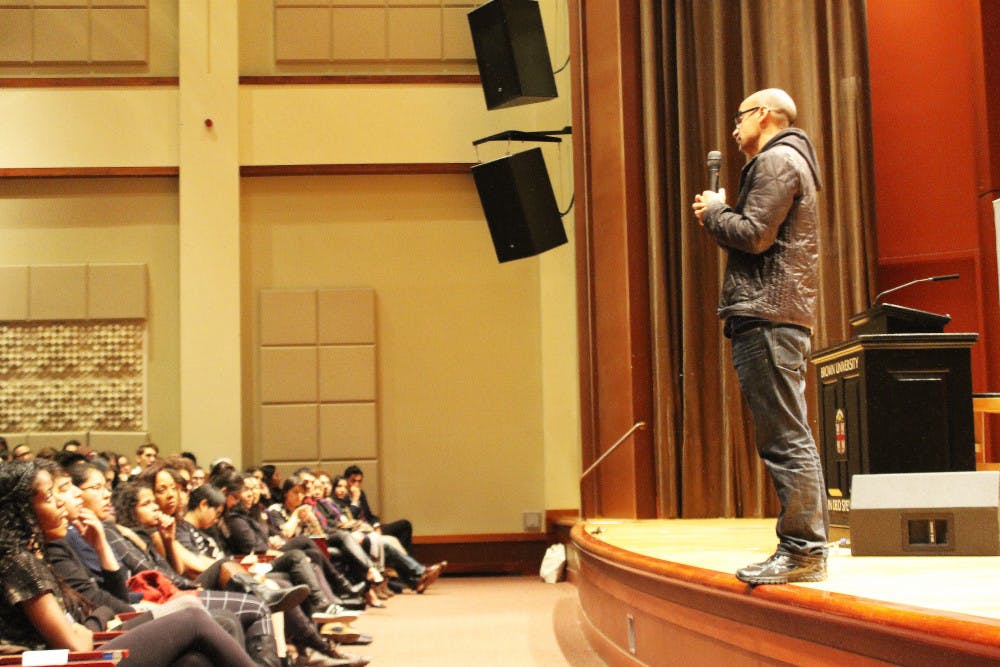“This has never been a safe space for us,” said Junot Díaz, referring to the social climate on college campuses across the nation and in society at large. “White supremacy has guaranteed us zero safety.”
Díaz, currently a professor at Massachusetts Institute of Technology, won a Pulitzer Prize for his novel “The Brief Wondrous Life of Oscar Wao” in 2008 and a MacArthur Fellowship in 2012. The distinguished writer spoke about the use of academia to achieve social justice and the relationship between scholarship and social activism to a crowded audience comprising Brown and Providence community members in Salomon 101 Saturday evening.
The lecture was coordinated and presented by the Heritage Series at the Brown Center for Students of Color and co-sponsored by several of the University’s academic departments, programs, centers and institutes, as well as the Offices of Institutional Diversity and the President.
Both the opening address from Latino Heritage Series Coordinators Lehidy Frias ’17 and Kiki Tapiero ’17 and Díaz’s introduction by Monica Martinez, assistant professor of American studies, highlighted the significance of Díaz’s lecture in the context of recent events involving student activism at Brown and other college campuses throughout the country. The lecture also served as the keynote address of the 10th annual Latinx Ivy League Conference held at Brown this weekend.
“His visit could not have come at a better time,” Martinez said.
While Díaz’s lecture was perceived to be particularly pertinent at this time, the author admitted that a visit to the University had been proposed some time ago. Frias “stayed on my ass for years,” Díaz said of her efforts to get him to speak at Brown, praising her for her persistence.
Though the event was intended to be a lecture followed by a brief question-and-answer session, Díaz chose to forego the lectern and insist that students drive the discussion because of a “resurgence of student activism” on college campuses over the past few weeks.
While students seemed hesitant to speak at first, eventually several audience members posed questions related to the experiences of people of color as students and activists on college campuses, allowing for the event to become exclusively a question-and-answer session.
The first question of the evening asked how to start dialogue between students who are not involved in or do not care about the issues that student activists seek to remedy.
Díaz acknowledged that there are many different tactics that are not wrong but not “perfectly right” when starting dialogue. He emphasized the importance of always having compassion when holding these conversations.
“I was trained to be an entrenched supporter of white supremacy,” Díaz said. “There are very few people who are not brought up that way. But having been in that position when I was younger, my approach to these kinds of conversations always begins with a baseline of compassion.”
Activists must remember that at some point in their lives, they may have held beliefs that they would now find repugnant, Díaz said. This personal evolution can serve as a reminder of the possibility for change, he said.
“As an activist, I’ve always kept that self of mine who was super messed up, because it reminds me of what is possible,” Díaz said.
The majority of the questions that followed during the hour-long event were related to racism in academia.
One student asked Díaz the best way to balance activism and academics when enrolled in a class taught by a professor who perpetuates racism, since professors have power in assigning grades and forming curriculums. Another student asked how to reassert black women as thinkers in the world of academia.
To answer these questions, Díaz urged students, particularly the students of color in the audience, to do their work in order to both educate themselves about liberation and to graduate. Díaz expressed that his “main goal” is to graduate students of color.
“You must recognize that we are in an educational system of deep scarcity,” Díaz said. “You survived growing up black, brown, yellow and indigenous. No one is more prepared.”
Díaz also encouraged students to be honest about their privilege as students in elite institutions while simultaneously taking into consideration the ways in which they are oppressed.
Díaz drew on his own experience as an activist, especially during his time at Cornell. In 1993, Díaz was instrumental in a four-day student protest aimed at remedying the underrepresentation and underserving of Latinos on campus known as the Day Hall takeover. Díaz said students should formulate a list of specific demands to guarantee institutional change that will outlast the four-year turnover of student activists.
Multiple students also asked how to bring ideas learned through social activism to their communities back home. Díaz implored students to engage in “hand to hand” work with people at home.
“If you’re not practicing altruism now, you won’t be practicing it in the future,” Díaz said.
“You don’t have to be a 24-hour activist,” Díaz added. “Even if you volunteer somewhere one hour a week, you will keep that flame alive.”
As the designated time for the lecture concluded, the crowd rose to give Díaz a standing ovation. A book signing immediately followed the discussion.
“In the end, we’re incredibly proud of you,” Díaz said as a parting thought. “This school was asleep a couple years ago, and you’ve woken it up.”





